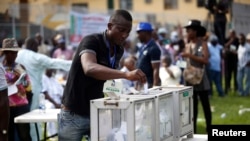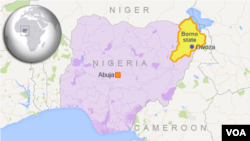Nigeria’s electoral commission is scrambling to find ways that will allow approximately 1 million people displaced by Boko Haram-related violence to vote in the February elections.
The independent commission says voters displaced by fighting in Borno, Yobe and Adamawa states can pick up their voter cards at designated centers and refugee camps, many of them located in the state capitals. Those locations are also where displaced voters will be able to cast their ballots.
That means tens of thousands of displaced Nigerians who have fled farther south must make their way back.
Journey required
To get his voter card, Bouba Musa traveled this week from Bauchi northeast to Maiduguri, a distance of roughly 470 kilometers or 202 miles. He is from Gwoza, a Borno state district that fell to Boko Haram militants in August.
Musa got his own card but was unable to find his wife’s, he said. "And other people, they are still here. They did not get anything concerning that voter card."
Now, Musa either must stay in Maiduguri or return next month from Bauchi if he wants to vote.
Currently, the presidential and National Assembly elections are scheduled for February 14, followed by governor and state assembly votes on February 28.
There will be no polling in Gwoza or other "high risk" areas. It’s too dangerous for electoral staff, Election Commission spokesman Nick Dazang said, and most civilians have fled areas occupied by Boko Haram.
But, Dazang added, "the security agencies have assured us of their capacity to secure" areas in and around the camps to enable voting.
No absentee ballots for diaspora
Refugees are another issue. Nigeria law does not allow diaspora voting. So people who fled to Niger, Chad or Cameroon must return to their home states to pick up voter cards and cast ballots.
Security may be an issue, as Boko Haram controls large swaths of territory in Nigeria’s northeast, especially in the border areas.
Disenfranchisement could have political implications. The northeast is a stronghold of the political opposition, the All Progressives Congress (APC).
Borno state governor and APC member Kashim Shettima told VOA the state has disbursed about $50,000 to transport Borno state refugees from Cameroon to Maiduguri. Arrangements also are being made to bus voters back from Niger, he said.
"It is not a partisan issue. It is a rights issue," Shettima said. "And nobody, no one, is doing us a favor by conducting elections in Borno, Yobe and Adamawa. It is our right to vote and be voted for."
If three states are effectively disenfranchised, losing parties would have grounds for challenging and perhaps even overturning the election results.
Dazang said the door on that risk of "constitutional crisis" remains “ajar.”
"We are very concerned about that, because by law if, for example, you are contesting for the presidency, you are supposed to get at least one-quarter of the votes in two-thirds of the states of the federation," he said. "So these states are crucial to any presidential election."
Manufacturing delay
Getting displaced northeasterners to vote is just one piece of the logistical puzzle ahead.
With less than a month to go, there are about 30 million voter cards left to distribute – affecting about half the electorate. Roughly 10 million cards have not arrived from the manufacturer, the electoral commission told VOA.
Nigeria’s national security adviser, Sambo Dasuki, said he advised the electoral commission to postpone the vote until every potential voter has received a card.
"It does not cost you anything, it is still within the law and it is safer for all of us,” Dasuki said from London, where he’s visiting. “So that is what we are encouraging."
By law, Nigeria has until April to hold the polls.
Contributors to this story included two others reporting from Nigeria: Ardo Hazzad in Bauchi and Kareem Haruna in Maiduguri.





